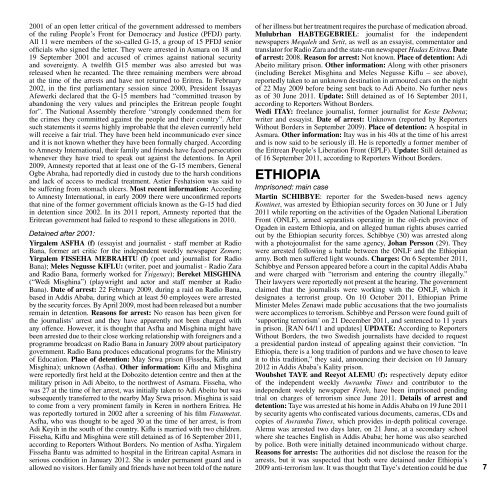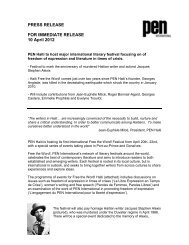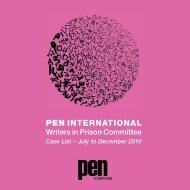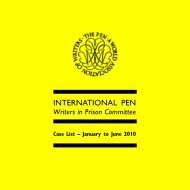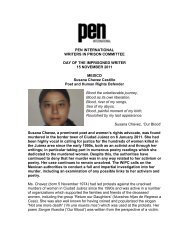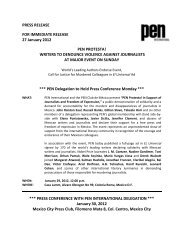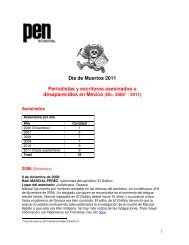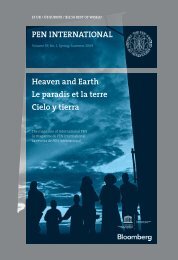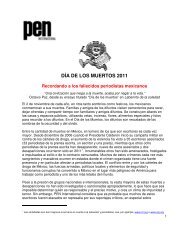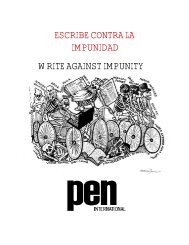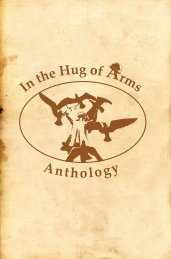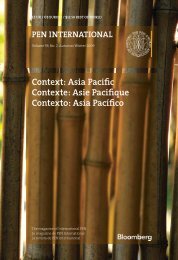here - PEN International
here - PEN International
here - PEN International
- No tags were found...
You also want an ePaper? Increase the reach of your titles
YUMPU automatically turns print PDFs into web optimized ePapers that Google loves.
2001 of an open letter critical of the government addressed to membersof the ruling People’s Front for Democracy and Justice (PFDJ) party.All 11 were members of the so-called G-15, a group of 15 PFDJ seniorofficials who signed the letter. They were arrested in Asmara on 18 and19 September 2001 and accused of crimes against national securityand sovereignty. A twelfth G15 member was also arrested but wasreleased when he recanted. The three remaining members were abroadat the time of the arrests and have not returned to Eritrea. In February2002, in the first parliamentary session since 2000, President IssayasAfewerki declared that the G-15 members had “committed treason byabandoning the very values and principles the Eritrean people foughtfor”. The National Assembly t<strong>here</strong>fore “strongly condemned them forthe crimes they committed against the people and their country”. Aftersuch statements it seems highly improbable that the eleven currently heldwill receive a fair trial. They have been held incommunicado ever sinceand it is not known whether they have been formally charged. Accordingto Amnesty <strong>International</strong>, their family and friends have faced persecutionwhenever they have tried to speak out against the detentions. In April2009, Amnesty reported that at least one of the G-15 members, GeneralOgbe Abraha, had reportedly died in custody due to the harsh conditionsand lack of access to medical treatment. Astier Feshatsion was said tobe suffering from stomach ulcers. Most recent information: Accordingto Amnesty <strong>International</strong>, in early 2009 t<strong>here</strong> were unconfirmed reportsthat nine of the former government officials known as the G-15 had diedin detention since 2002. In its 2011 report, Amnesty reported that theEritrean government had failed to respond to these allegations in 2010.Detained after 2001:Yirgalem ASFHA (f) (essayist and journalist - staff member at RadioBana, former art critic for the independent weekly newspaper Zemen;Yirgalem FISSEHA MEBRAHTU (f) (poet and journalist for RadioBana); Meles Negusse KIFLU: (writer, poet and journalist - Radio Zaraand Radio Bana, formerly worked for Tsigenay); Bereket MISGHINA(“Wedi Misghina”) (playwright and actor and staff member at RadioBana). Date of arrest: 22 February 2009, during a raid on Radio Bana,based in Addis Ababa, during which at least 50 employees were arrestedby the security forces. By April 2009, most had been released but a numberremain in detention. Reasons for arrest: No reason has been given forthe journalists’ arrest and they have apparently not been charged withany offence. However, it is thought that Asfha and Misghina might havebeen arrested due to their close working relationship with foreigners and aprogramme broadcast on Radio Bana in January 2009 about participatorygovernment. Radio Bana produces educational programs for the Ministryof Education. Place of detention: May Srwa prison (Fisseha, Kiflu andMisghina); unknown (Asfha). Other information: Kiflu and Misghinawere reportedly first held at the Dobozito detention centre and then at themilitary prison in Adi Abeito, to the northwest of Asmara. Fisseha, whowas 27 at the time of her arrest, was initially taken to Adi Abeito but wassubsequently transferred to the nearby May Srwa prison. Misghina is saidto come from a very prominent family in Keren in northern Eritrea. Hewas reportedly tortured in 2002 after a screening of his film Fistametat.Asfha, who was thought to be aged 30 at the time of her arrest, is fromAdi Keyih in the south of the country. Kiflu is married with two children.Fisseha, Kiflu and Misghina were still detained as of 16 September 2011,according to Reporters Without Borders. No mention of Asfha. YirgalemFisseha Bantu was admitted to hospital in the Eritrean capital Asmara inserious condition in January 2012. She is under permanent guard and isallowed no visitors. Her family and friends have not been told of the natureof her illness but her treatment requires the purchase of medication abroad.Mulubrhan HABTEGEBRIEL: journalist for the independentnewspapers Meqaleh and Setit, as well as an essayist, commentator andtranslator for Radio Zara and the state-run newspaper Hadas Eritrea. Dateof arrest: 2008. Reason for arrest: Not known. Place of detention: AdiAbeito military prison. Other information: Along with other prisoners(including Bereket Misghina and Meles Negusse Kiflu – see above),reportedly taken to an unknown destination in armoured cars on the nightof 22 May 2009 before being sent back to Adi Abeito. No further newsas of 30 June 2011. Update: Still detained as of 16 September 2011,according to Reporters Without Borders.Wedi ITAY: freelance journalist, former journalist for Keste Debena;writer and essayist. Date of arrest: Unknown (reported by ReportersWithout Borders in September 2009). Place of detention: A hospital inAsmara. Other information: Itay was in his 40s at the time of his arrestand is now said to be seriously ill. He is reportedly a former member ofthe Eritrean People’s Liberation Front (EPLF). Update: Still detained asof 16 September 2011, according to Reporters Without Borders.ETHIOPIAImprisoned: main caseMartin SCHIBBYE: reporter for the Sweden-based news agencyKontinet, was arrested by Ethiopian security forces on 30 June or 1 July2011 while reporting on the activities of the Ogaden National LiberationFront (ONLF), armed separatists operating in the oil-rich province ofOgaden in eastern Ethiopia, and on alleged human rights abuses carriedout by the Ethiopian security forces. Schibbye (30) was arrested alongwith a photojournalist for the same agency, Johan Persson (29). Theywere arrested following a battle between the ONLF and the Ethiopianarmy. Both men suffered light wounds. Charges: On 6 September 2011,Schibbye and Persson appeared before a court in the capital Addis Ababaand were charged with “terrorism and entering the country illegally.”Their lawyers were reportedly not present at the hearing. The governmentclaimed that the journalists were working with the ONLF, which itdesignates a terrorist group. On 10 October 2011, Ethiopian PrimeMinister Meles Zenawi made public accusations that the two journalistswere accomplices to terrorism. Schibbye and Persson were found guilt of‘supporting terrorism’ on 21 December 2011, and sentenced to 11 yearsin prison. [RAN 64/11 and updates] UPDATE: According to ReportersWithout Borders, the two Swedish journalists have decided to requesta presidential pardon instead of appealing against their conviction. “InEthiopia, t<strong>here</strong> is a long tradition of pardons and we have chosen to leaveit to this tradition,” they said, announcing their decision on 10 January2012 in Addis Ababa’s Kality prison.Woubshet TAYE and Reeyot ALEMU (f): respectively deputy editorof the independent weekly Awramba Times and contributor to theindependent weekly newspaper Feteh, have been imprisoned pendingtrial on charges of terrorism since June 2011. Details of arrest anddetention: Taye was arrested at his home in Addis Ababa on 19 June 2011by security agents who confiscated various documents, cameras, CDs andcopies of Awramba Times, which provides in-depth political coverage.Alemu was arrested two days later, on 21 June, at a secondary schoolw<strong>here</strong> she teaches English in Addis Ababa; her home was also searchedby police. Both were initially detained incommunicado without charge.Reasons for arrests: The authorities did not disclose the reason for thearrests, but it was suspected that both were detained under Ethiopia’s2009 anti-terrorism law. It was thought that Taye’s detention could be due 7


